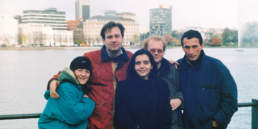In April 1995 – to the weekend exactly 22 years ago – I went to the first event by the young antenna AEGEE-Skopje, a conference about privatisation. It was my first visit to this magnificent country with great people, but not my last one. I came back for a marvellous Travelling Summer University the next year plus the two Agoras organised by the antenna. But the memories of this first event were very special. This is the story.
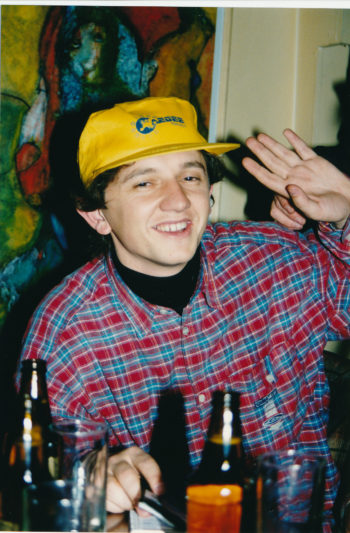
The Serbian border guard was flipping through the passport. My passport. “Where is your visa?”, he asked in a not too friendly way. “Visa? Can’t I get it here?” I smiled. He didn’t. “Come with me”, he said, put my passport in the pocket and showed me the way to the exit of the train. He led me to the passengers’ waiting room of the old train station of Subotica, the Serbian city at the border to Hungary. “Tomorrow morning you will take the first train to Budapest. Then you’ll get the passport back. Until then: don’t leave the station.”
My trip to Skopje couldn’t have started worse. And I was so enthusiastic about going to the capital of Macedonia, where AEGEE-Skopje was about to organize it’s very first event, the congress with the too long title “Privatization in Central and Eastern Europe with a special view on Former Yugoslavian Republic of Macedonia”.
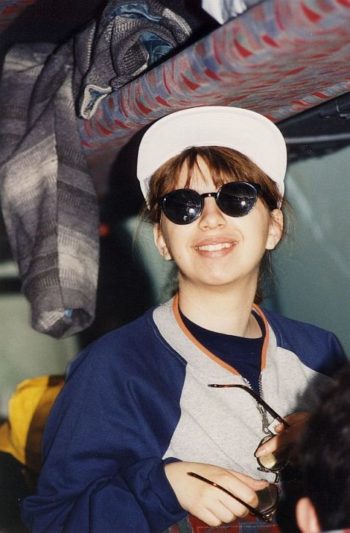
How did I end up there? For that, we have to go a few days back. The weekend before, I was at the Agora in Amsterdam. It was April 1995 and I was AEGEE member for precisely two months. I felt totally lost in the big crowd, when at one party one of the few people that I knew told me that she was going to Skopje the following weekend. “Why don’t you go too?” she asked. I replied: “Why not”, while at the same moment I wondered where Skopje actually is…
After the Agora I went to Eindhoven. I knew some members there, because AEGEE-Eindhoven was the twin antenna of AEGEE-Szeged, when the concept of twin antennae did not exist yet. When I told one big bald guy that I wanted to go to Skopje, he enthusiastically said: “Yes, you must go there!” It turned out that he helped the young contact antenna a lot to come into existence and organise its first event, because his former girlfriend was one of the founders.
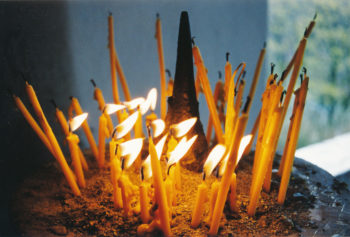
Three days later, I was on the train from Budapest to Skopje. I studied in Szeged in Southern Hungary at that time and my Hungarian friends told me that visa were not necessary to go to Serbia. Well, not for them, but for me being German, yes. So I waited in the train station of Subotica, slept on the wooden benches, where some Canadians with the same fate were stranded, and took the train back to Budapest the next morning.
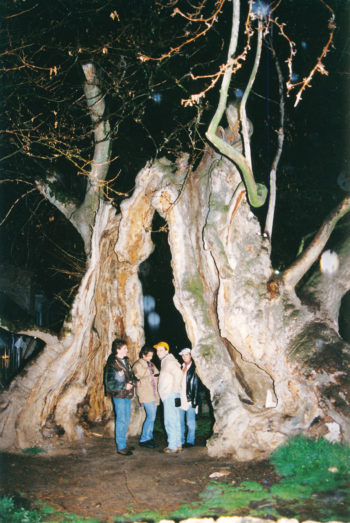
There was still time to go to Skopje, because it was only Thursday and the conference programme started only on Friday, 14th of April 1995. However, the train was late and I arrived to the Serbian consulate at Heroes’ Square just five minutes before closing time. All employees of the consulate were coming right out of the building already and did not even bother to look at me when I asked them about a visa. So I took the next train to Szeged and came back the next morning. This time I got the visa, hopped on the afternoon train, changed in Nis in the middle of the night and arrived to the Serbian-Macedonian border at 5 a.m. The train was actually supposed to go to Skopje, but it didn’t. All passengers went to a bus station where a Serbian guy, who spoke German, told me which bus to take, where to change to another bus and how much to pay.
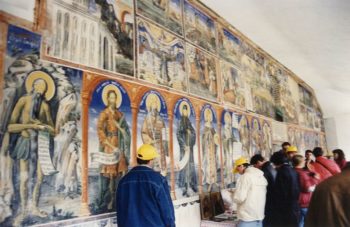
The bus drivers were driving their buses like Formula 1 cars over the curvy roads, but I didn’t mind, because at 10 a.m. I reached Skopje. The time, when the conference programme of the second day was about to start. At the bus station I called one of the organisers from a public phone – at that time no one had mobile phones. He picked me up and took me to the Faculty of Law, where the event took place.
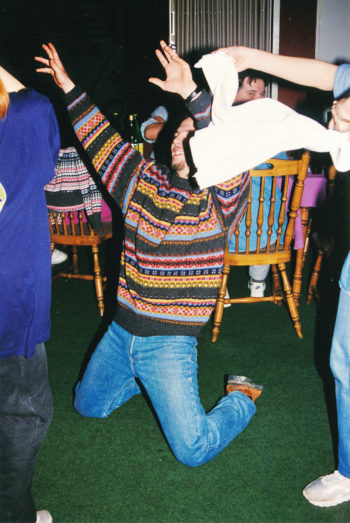
Finally I could enjoy the conference.
The topic of the event was quite fashionable at that time. In most countries in Central and Eastern Europe the privatisation of state-owned enterprises was in full swing. There were different models. While most governments sold the companies to foreign investors, who had the financial resources and knowledge to make the old companies more successful and get their products successfully on the market, other countries sold the companies to their citizens with the help of vouchers. In some countries the governments sold the companies to friends or themselves.
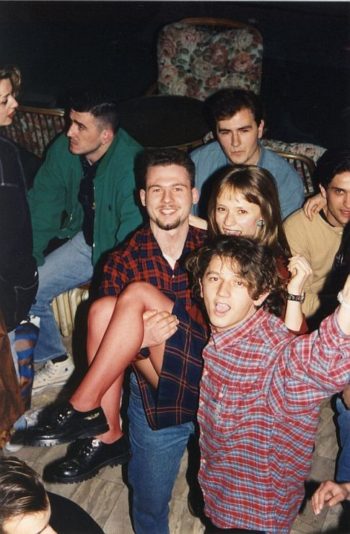
The conference organisers got some very prominent speakers, which was no surprise, since one of the members was the daughter of the finance minister. Among the speakers were (surprise!) the minister of finance, Jane Miljovski, and the director of the Agency for Transformation of the Enterprises, Verica Hadzi-Vasileva Markovska. During the afternoon of day two there was a panel discussion on “The privatization process and the flow of people, ideas and capital”. When I arrived, I had no clue that I would be among the panelists! After I entered the room, one of the organisers came to me and said: “You are from Germany, right? So you know about the privatisation in Eastern Germany, right?” “Ehm, well, yes, something, why?” “Two of our panellists cancelled and we need a replacement so that we have at least three people. Just tell me what you know and I’ll ask you questions about that.” And so, I became speaker at the event. It was going fine, but I was so glad when the panel was over… The whole congress was followed by national TV every day, and there were reports of the results in all major newspapers – which showed again what great contacts the organisers had.
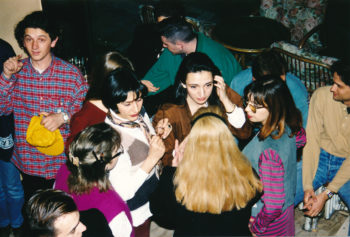
This second day was also the end of the serious programme of the event and the whole group left next morning for Ohrid, the magnificient old town at Lake Ohrid in the west of the country. The group of about 25 foreign plus 20 local participants plus more local organisers went to this great city of literature, culture and history together by bus. After checking in at our hotel, we visited all kind of great cultural places, of which the famous monastery was the most impressive one by far. Just one year before the conference, the Oscar-nominated anti-war film “Before the rain” was shot there, which we watched together with the whole group on video. Later on, we also visited the already privatized brewery of Skopje, where we had the opportunity to see how the privatization worked in practice.
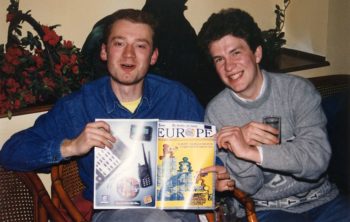
It was the beautiful place and even more the amazing and friendly spirit of the organisers from AEGEE-Skopje that caught our hearts. So it was no surprise that nearly all participants spontaneously decided to stay one day longer. No one was in a hurry anyway. Eight of the participants came from Turkey, another eight from Bulgaria; they were extremely relaxed about their timetable, and we, the others, were mainly from Slovakia, Germany and France and wanted to find out as much as possible about this great place in the company of the great organisers. For us time didn’t matter anyway, since it was Easter that weekend. Among the Turkish participants was Refet Saban, one of the founders of AEGEE-Ankara and later CD member. An amazing person like everyone from the Turkish group. It was a shock for us to hear that one Turkish girl died a few months later in a car accident, with also other member from AEGEE-Ankara being in the same car.
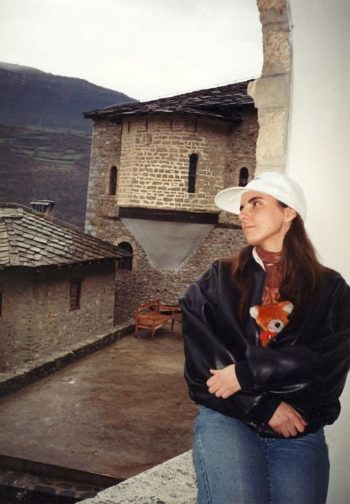
Coming back from Ohrid to Skopje, we stayed at the places of the local organisers. The host, where two other participants and I stayed, was awesome. And like some other members, he did not only study, but also had a job. When we woke up next morning, he said: “If you want, you can switch on TV later. You will see me there as presenter.”
He also gave us a great sightseeing tour, where he told us a lot about local politics and culture. I remember clearly when we went to some viewing point over the city and he pointed at the minarets of the ethnic Albanians in Skopje. “You see the minarets? Their number doubled in the past ten years”, he said. “Now Albanians are 40 percent of our population.” He looked very concerned of becoming a minority in his country. He was also concerned for the unstable political situation and the hostile relationships with their neighbours Yugoslavia (Serbia-Montenegro) and Greece. And of course the relationship with Albania was also very bad. So it was no surprise that UN peacekeeping troops were stationed in Macedonia, which helped stabilising the situation.
It was not an easy situation for the country – neither politically nor economically. It definitely weren’t easy times for many of the AEGEE-Skopje members either. But nevertheless, this didn’t keep them from treating every participant with so much friendliness and warm spirit. With lots of great memories in my mind I went home to Hungary, where the next event was already waiting next weekend: a conference by AEGEE-Budapest. But that’s another story…

